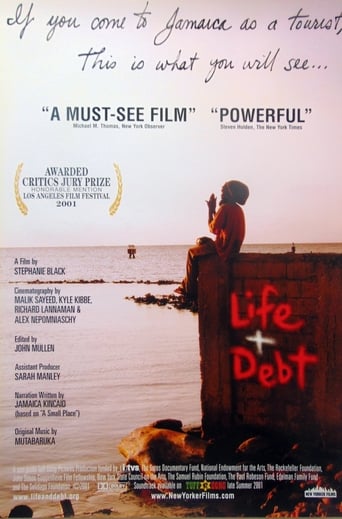Life and Debt (2001)
Life and Debt is a 2001 American documentary film that examines the economic and social situation in Jamaica, and specifically how the International Monetary Fund and the World Bank's structural adjustment policies have impacted the island.
Watch Trailer
Free Trial Channels
Cast


Similar titles
Reviews
Plot so thin, it passes unnoticed.
Easily the biggest piece of Right wing non sense propaganda I ever saw.
Great story, amazing characters, superb action, enthralling cinematography. Yes, this is something I am glad I spent money on.
Great example of an old-fashioned, pure-at-heart escapist event movie that doesn't pretend to be anything that it's not and has boat loads of fun being its own ludicrous self.
This film, though somewhat simplistic and emotional (for obvious reasons), does an excellent job of conveying to a broad audience some of the negative effects of globalization on a small, developing economy like that of Jamaica. One often hears critiques of international capitalism and the lending policies of the IMF and World Bank, but in most cases the criticism lacks pertinent examples of the direct impacts of globalization, or fails to make an effective case for why we should care. This film manages to do both, by providing relevant facts (increases in national debt over time, predatory interest rates tied to 'development' loans from the World Bank, critical industries undercut by international competition, etc.), and illustrating the ground-level effects on Jamaican citizens both visually and through numerous informative interviews. The film is interspersed with scenes of oblivious American tourists enjoying their vacations at expensive Jamaican resorts safely isolated from the surrounding poverty, to highlight the developed world's ignorance about the plight of Jamaica and similar underdeveloped countries.As a precondition for aid, the IMF and World Bank usually require that developing countries drop any significant barriers to trade. When the doors are opened to international trade, lower-priced goods from abroad undercut local goods, and eliminate the market for any industry that cannot compete with the mass production that larger economies are capable of. While opening barrier-free worldwide markets for goods and services benefits the large economies already in a position to compete on such a scale, the sudden and forced introduction of 'free' trade to underdeveloped economies often disrupts domestic industries, which are given no opportunity to transition. While the consumer market is suddenly flooded with relatively cheaper goods (cheap enough to undercut the local competition, not to benefit consumers in any way), globalization fails to provide domestic producers with the inputs and capital (fertilizer, machinery, etc.) necessary to compete with producers abroad. As a result, the economy is robbed of its traditional sources of income and capacity for self-sufficiency, instead becoming reliant on weak foreign aid and tourism as national poverty continues to increase.
Given the gushingly positive reviews this movie has received elsewhere on IMDb, given the negative review I am about to give it must be clear that I must be some pro-big business evil white capitalist who probably drives a Hummer and kills baby seals for fun, right? No, not really. I am actually rather skeptical of many globalization's claims, specifically how they relate to income distribution. However, apparently unlike many of other commenters, I actually know a thing or two about economics and refuse to be swayed by the emotionally strong but intellectually bankrupt arguments that, for the most part, this movie consists of.Here's a basic summary of the movie: 1. Jamaica is straddled with significant debts to the IMF (the movie states US $7b) 2. The IMF is a mechanism created by rich white countries to keep poor dark countries poor. 3. As a tourist, you will ignorantly go to Jamaica and enjoy your time. All the while, most of the money you spend will go back to foreign corporations. The Jamaicans will smile at you as they serve you, but secretly they mostly hate you, or at least what you represent and are doing to their country.Overlay this theme with somber reggae music and implications of racism and you have a story that would make the ignorant want to join the ranks of the Molotov cocktail at any given G8 summit.Unfortunately, it's pretty much complete nonsense.For example, one thing that this movie states is that the IMF (or some other international boogeyman) forced Jamaica to devalue its currency out of some evil plot to economically enslave Jamaicans. The reality is that the previously artificially high Jamaican currency served only the Jamaican elite the IMF's insistence that the Jamaican currency actually be subject to market forces (as part of a structural adjustment program associated with the IMF loans that were intended to keep Jamaica from slipping back into the fiscal irresponsibility that got it into the position of needing to take loans in the first place) ensures that the country remain an attractive destination for tourist dollars and gives strength to its export businesses.Let's not forget: Jamaica is a beautiful country that can generate money through tourism pretty much as easily as Arab countries can pull oil from the ground. Jamaica had benefited from generally moderate and reasonable colonial rule and has had no significant conflicts since. It sits within enviable flight time from the wealthy USA and enjoys status as a destination for Europeans as well due to its historical ties. Its people, culture, and music are generally seen in a positive light. In short, Jamaicans are very lucky indeed compared to, say, Haitians.And so the movie goes on and on. Look at the poor Jamaicans. You are a stupid and fat tourist. Don't you even consider when you flush the toilet in your hotel that some of the waste goes into the same ocean that used to bring slaves from Africa? (Yes, this is actually what the movie pretty much says at some point the point of "you Jamaican since you inherited a sound governmental and educational system from Great Britain, why can't you set up proper laws to prevent this if you are so concerned?" is nowhere to be found.) In short, according to this movie everything that happens bad to Jamaica is not Jamaica's fault. Its America's fault that Jamaica's farmers use inefficient and ancient farming methods to the point where they can't even compete with imported food even given the Jamaican currency weakness and relative ease of transport. Large foreign businesses are evil because they both set up shop there to "exploit" local Jamaicans by giving them jobs, and then by pull out when corruption and inefficiency make them unprofitable.Jamaica has relatively high literacy (partly a colonial legacy). It also has high levels of fundamentalist religiosity and substance abuse two factors that the film doesn't really go into, since, well, that would be far harder than just pointing fingers. I feel sorry for the people of Jamaica. Theirs is no easy life. But, to put the blame on tourists and the IMF, arguably the two things that are actually keeping the country afloat and not disintegrating into Haiti, is perverse. Don't fall for this movie's propaganda.
For anyone who wonders "why they hate us," watch this documentary and the mystery will be solved. It thoroughly documents how the US, the WTO, and the IMF have systematically destroyed every aspect of Jamaican economic opportunity and culture.The US didn't abolish slavery in the 19th century; they simply outsourced it. Take a look inside the Kingston Free Zone and you'll see the slaves still at work. Visit a Jamaican banana plantation and learn about how the economy of a sovereign nation was subjugated in the name of "free trade."In short, fellow fat Americans, pull your heads out of your globalizing butts and watch this film, and then try -- for just a moment, at least -- to put yourself on the other side of the coin. Imagine how you would feel about a foreign agency that took away your livelihood, that treated you like chattel, that demanded you stop making a living so that a transnational corporation could capture the last 5% of a market share.Wouldn't you hate them, too?
This documentary perfectly captures the largely-ignored downside to globalization and the subsequent domination of the world economy by the U.S. and Western Europe. Namely, that undeveloped and developing countries continue to get poorer at the expense of the rich. This documentary presents the human side for discussions about the impact of multinational corporations on human rights abuses, price fixing in order to drive local competition into failure, environmental destruction as the result of World Bank-mandated "structural adjustments," etc. This is a must see for anyone who thinks that globalization is the only way for developing countries to compete with the rest of the world, and for anyone wanting to know the reasons behind all of those protests.









